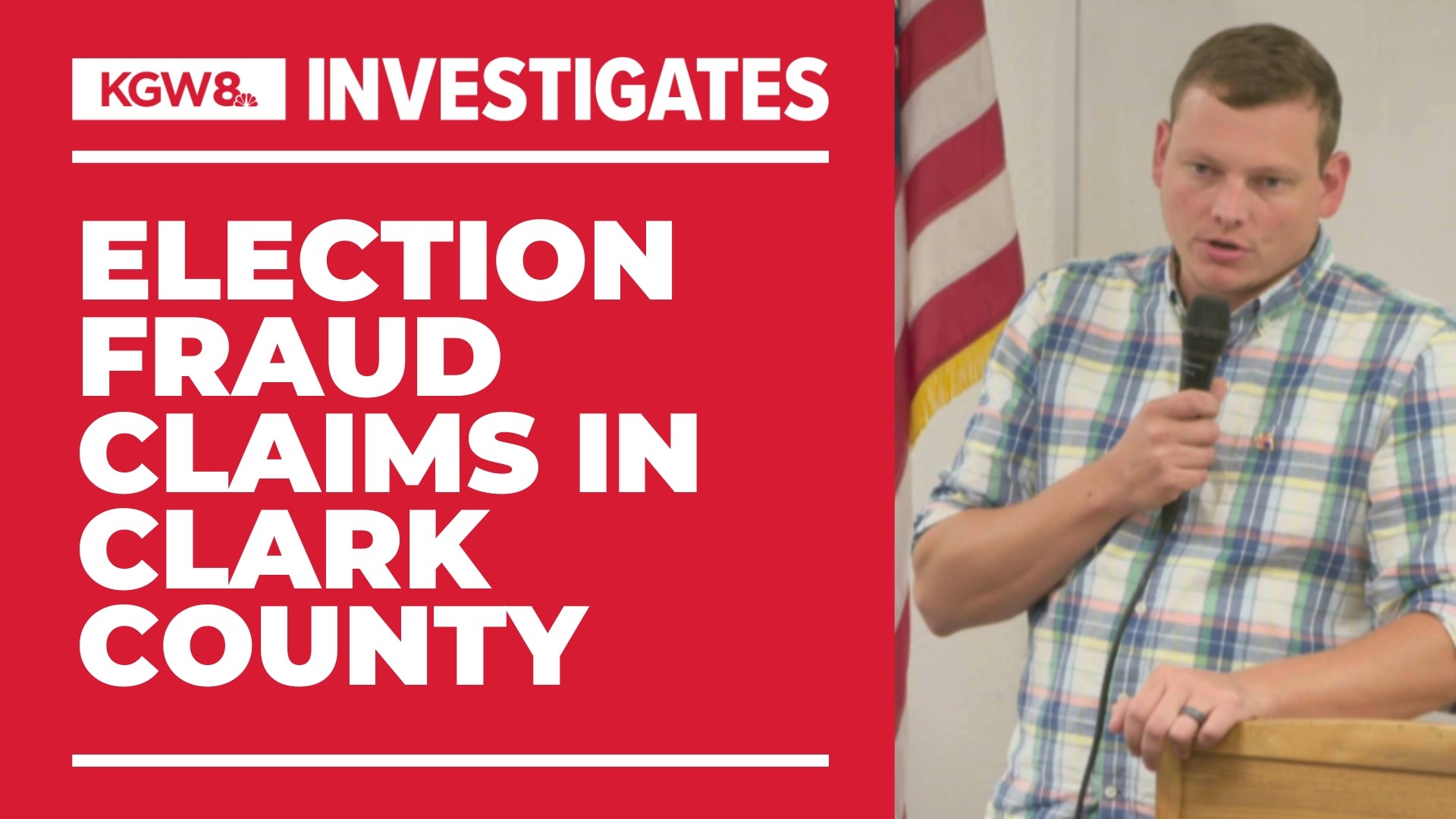CLARK COUNTY, Wash. — Nationwide, typically mundane races such as county auditor positions have attracted increased interest due to unfounded claims about widespread voter fraud.
That includes this election in Clark County, where voters will choose who will supervise elections for the next four years.
Candidate Brett Simpson is running against incumbent auditor Greg Kimsey, who has held the position for close to 24 years. At a recent campaign rally for Republican congressional candidate Joe Kent, Simpson told voters that election fraud is rampant in the county.
“You can see the scale of the fraud that’s taking place in the state of Washington, here in Clark County ... we ended up with over 90% of all ballots returned," Simpson said about the 2020 presidential election. "It’s an impossibility, it’s completely out of normal and it’s completely out of the (history) of voting in the United States."
Certified vote totals refute Simpson's claims about voter turnout in the 2020 election, and state and local officials say there is no evidence of voter fraud in Clark County as Simpson claims.
About 85% of registered voters in Clark County voted in the 2020 presidential election. Similarly, about 85% of voters cast their ballots in 2008, as Barack Obama and John McCain squared off.
About 77% of voters turned out in 2016. Clark County does report lower percentages of voter turnout in non-presidential elections, which is common across most localities.
KGW asked county auditor Greg Kimsey, who both oversees the county’s election results and is running for re-election against Simpson, for his response to Simpson’s numerous claims of voter fraud.
"It’s so patently not true, the returns in 2020 were not at all abnormal," Kimsey said.
Kimsey said he feels dismayed and astounded that people believe disproven claims about widespread election fraud.
"Misinformation about elections undermines people’s confidence in the results of the elections, which is a direct threat to our democracy," he said.
At the Kent campaign event, one of Simpson’s statements received a bigger reaction from the gathered crowd than the rest.
"We actually don’t own our own voter registrations, it’s done by a third-party company by the name of ERIC, the Electronic Registration Information Center. It was seed-funded by George Soros’ Open Society in 2011," said Simpson, to a collection of gasps and audible responses from the crowd.
So, what is ERIC?
ERIC is a nonprofit organization made up of a coalition of 33 states and Washington, D.C. It reviews voter rolls to help make sure they’re accurate and up to date.
As many people don’t remember to update their voter registration when they move between states, or because people die or leave the country, ERIC provides reports to states to help them prevent potential voter fraud.
ERIC has been the target of conspiracy theories from far-right media this year.
Washington’s state elections director, Stuart Holmes, told KGW that ERIC is, simply put, a huge help.
"To say that ERIC is doing anything (to voter rolls) is misleading, it's providing us with data and information that we would otherwise not have in order to increase the integrity of the voter registration rolls," Holmes said. "It’s a tool that we need as election administrators to make sure people that are registered in other states get removed from voter rolls in our state."
The state of Washington was one of seven states of both Republican and Democratic leaderships that started ERIC in 2012. It's grown in use by states since then, with leaders of both political parties — including the Republican Secretary of State in Alabama — praising its informative services.
As for Simpson’s claims about George Soros, the billionaire philanthropist, other critics have highlighted that Soros' Open Society Foundations gave a one-time, $500,000 contribution to Pew Charitable Trusts.
A spokesperson for Pew Charitable Trusts said the Open Society Foundations grant was received in 2009 and was not used to support ERIC.
Instead, the spokesperson said it was used for other election administration work such as the Voting Information Project.
Pew is a national nonpartisan nonprofit that receives more than $300 million in grants annually.
Pew provided start-up funding for ERIC in 2012, but ERIC has since been funded by the member states. It's also controlled and managed by election officials from all participating states.
It’s up to individual states to submit voter registration and licensing data to ERIC, then state and local officials use any reports to check and manage their own voter lists.
"So we end up with much better registration, much cleaner and more accurate voter registration rolls with ERIC than without ERIC," Kimsey said.
After hearing Simpson speak at the campaign event, KGW verified information with the Washington Secretary of State's office, Clark County voting records and ERIC.
KGW then asked Kimsey for comment on Simpson's claims. Tuesday, KGW asked Simpson if he would like to add to or clarify his statements about voter fraud.
Simpson did not reply, however he posted a video on his Facebook page Wednesday afternoon, saying any upcoming report would be a "hit piece" and "gaslighting" from the "mainstream media." He also criticized media attention on the auditor's race, calling it "literally unprecedented."
Simpson did not respond to questions about his false claims about ERIC, or the voter turnout in Clark County from the 2020 presidential election.
Kimsey said voters with questions and concerns about the election administration process should contact their local elections department or the Secretary of State's office for answers and information.

